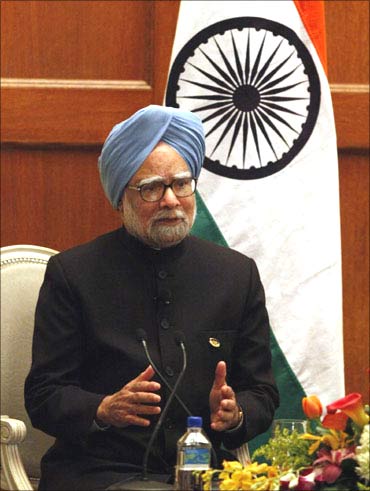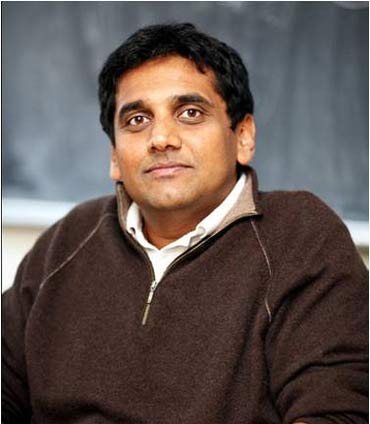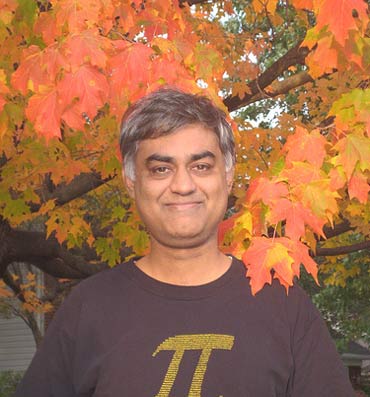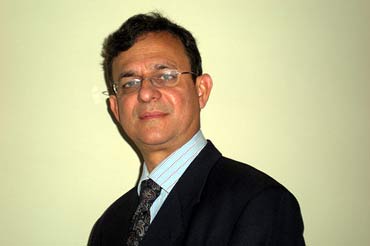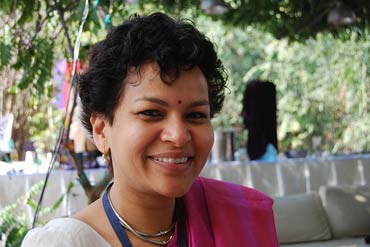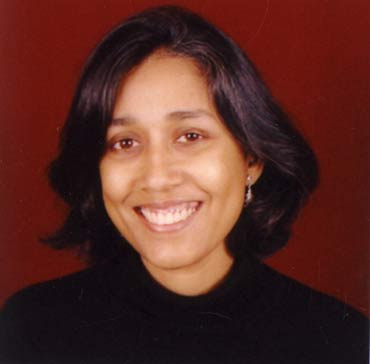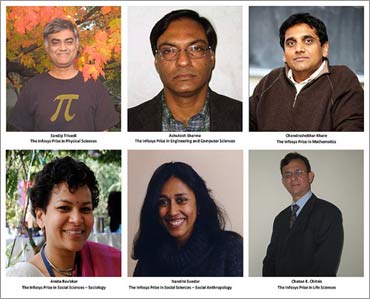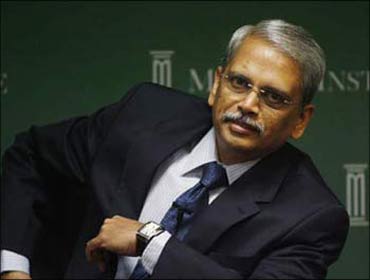 | « Back to article | Print this article |
The 6 outstanding winners of the Infosys Prize
The Infosys Science Foundation on Thursday awarded winners of Infosys Prize 2010 recognising their outstanding achievements in scientific research.
Prime Minister of India Manmohan Singh, who was the chief guest on the occasion, felicitated the laureates across five categories: Mathematical Sciences, Physical Sciences, Engineering and Computer Science, Life Sciences and Social Sciences in Mumbai.
Speaking on the occasion, the prime minister took note of the growing share of private players in education sector for profit and said this trend could emerge as 'worrisome barrier' to freer access to knowledge for all.
"Indeed with the growing share of privately funded for-profit educational institutions, this may be emerging as a worrisome barrier to freer access to knowledge for all our people," he said.
The prime minister said that the initiative of the UPA government on Right to Education Act was "really special". He said it was the responsibility of the government to create wider talent and knowledge base.
Emphasising the importance of scholarship, Singh said his government has taken several initiatives for funding in this regard.
He lauded the Infosys Science Foundation for encouraging disciplines like mathematical, physical, engineering and computer sciences, life and social sciences.
So check out who the laureates of the Infosys Prize 2010, in the different disciplines are.
Click NEXT to read on . . .
The 6 outstanding winners of the Infosys Prize
Mathematical Sciences
Prof. Chandrashekhar Khare of University of California at Los Angeles in recognition of his fundamental contributions to Number Theory, particularly his solution of the Serre conjecture.
The prize in each category comprised a 24 karat gold medallion, a citation expounding the laureate's work and Rs 50 lakh (tax free) as prize money.
During the event, the jury chairs of the prize categories - Prof. Srinivasa Varadhan for Mathematical Sciences, Prof. Shrinivas Kulkarni for Physical Sciences, Dr. Ramesh Mashelkar (stepping in for Prof. Subra Suresh) for Engineering and Computer Science, Prof. Inder Verma for Life Sciences and Prof. Amartya Sen for Social Sciences - described the evaluation methodology for each category, introduced the winners and shared details about their award winning research.
Click NEXT to read on . . .
The 6 outstanding winners of the Infosys Prize
Physical Sciences
Prof. Sandip Trivedi of Tata Institute of Fundamental Research for finding an ingenious way to solve two of the most outstanding puzzles of Superstring Theory simultaneously: What is the origin of dark energy of the Universe? Why is there no massless scalar particle?
The six winners of this year were drawn from 201 nominations. The jury, comprising eminent leaders in each of these fields, evaluated the achievements of the nominees against the standards of international research, placing the winners at par with the finest researchers in the world.
Click NEXT to read on . . .
The 6 outstanding winners of the Infosys Prize
Engineering and Computer Science
Prof. Ashutosh Sharma of Indian Institute of Technology, Kanpur for his fundamental contributions to mechanics, materials and manufacturing on small scales including self-organization and instabilities, nano-patterning and functional multiscale interfaces.
Click NEXT to read on . . .
The 6 outstanding winners of the Infosys Prize
Life Sciences
Dr Chetan E Chitnis of International Centre for Genetic Engineering and Biotechnology (ICGEB), for his pioneering work in understanding the interactions of the malaria parasite and its host, leading to the development of a viable malaria vaccine.
Click NEXT to read on . . .
The 6 outstanding winners of the Infosys Prize
Social Sciences
Sociology
Prof. Amita Baviskar of Institute of Economic Growth in recognition of her contributions as an outstanding analyst of social and environmental movements in modern India.
Click NEXT to read on . . .
The 6 outstanding winners of the Infosys Prize
Social Anthropology
Prof. Nandini Sundar of Delhi School of Economics in recognition of her contributions as an outstanding analyst of social identities, including tribe and caste, and the politics of knowledge in modern India.
Click NEXT to read on . . .
The 6 outstanding winners of the Infosys Prize
Congratulating the laureates, K. Dinesh, co-founder, Infosys, said, "Scientific research is of utmost importance for India's rapid economic and social development. We endeavour to encourage the scientific community to make breakthroughs and discoveries that will drive the nation forward in the years to come.
To advance and promote scientific research in India, the Infosys Prize recognizes and nurtures some of the finest researchers for their unparalleled achievements. We hope that initiatives like this will go a long way in motivating and encouraging young minds to undertake research as a career."
Click NEXT to read on . . .
The 6 outstanding winners of the Infosys Prize
The Infosys Prize is amongst the highest in terms of prize money for any award in India. The laureates of the Infosys Prize are chosen by individual jury panels, comprising international jurors who evaluate the candidates against international research. For more information, please visit www.infosys-science-foundation.com
The Infosys Science Foundation was established in February 2009 to promote world-cl-ass research in India. The Infosys Prize is an annual award across five disciplines to recognize and reward outstanding inventions or discovery or a cumulative body of work.
S. Gopalakrishnan, Infosys co-founder and chief executive, presented the vote of thanks.
